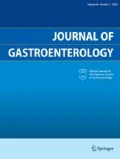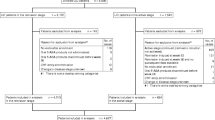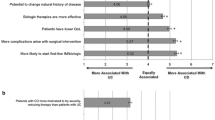Abstract
Background
Thirty to forty-five percent of ulcerative colitis (UC) patients show non-adherence to aminosalicylates, and non-adherence has been reported to increase the risk of clinical relapse. Because Japan differs from Western countries in terms of health care and drugs administered, adherence to aminosalicylates in Japan may differ from that elsewhere. Therefore, we examined aminosalicylate adherence and its relationship to the risk of clinical relapse of UC in Japan.
Methods
A 1-year, prospective cohort study was conducted in 104 outpatients with UC in remission who had taken aminosalicylates >6 months. Aminosalicylate adherence was evaluated using data from a self-administered questionnaire and medical records. Non-adherence was defined as taking <80 % of the prescribed dose of aminosalicylates. The primary outcome was the record of clinical relapse in medical charts.
Results
Twenty-nine patients (27.9 %) were evaluated as showing non-adherence. Among all subjects, 24 patients (23.1 %) relapsed. The non-adherence group had a higher rate of 1-year relapse than did the adherence group (41.3 vs. 16.0 %). Multiple Cox regression analysis showed that non-adherence increased the risk of clinical relapse 2.3-fold (hazard ratio 2.3, 95 % confidence interval 1.004–5.24, p = 0.04).
Conclusions
Although the adherence rate in this study was slightly higher than that in previous studies, Japanese patients with UC who were not adherent to their medications had a twofold greater risk of relapse than those who were. These results indicate the importance of early identification of patients with non-adherence. A program to support medication taking behavior is needed to prevent UC relapse.

Similar content being viewed by others
References
Baumgart DC, Sandborn WJ. Inflammatory bowel disease: clinical aspects and established and evolving therapies. Lancet. 2007;369:1641–57.
Asakura K, Nishiwaki Y, Inoue N, Hibi T, Watanabe M, Takebayashi T. Prevalence of ulcerative colitis and Crohn’s disease in Japan. J Gastroenterol. 2009;44:659–65.
Molodecky NA, Soon IS, Rabi DM, Ghali WA, Ferris M, Chernoff G, et al. Increasing incidence and prevalence of the inflammatory bowel diseases with time, based on systematic review. Gastroenterology. 2012;142:46–54.
Ooi CJ, Fock KM, Makharia GK, Goh KL, Ling KL, Hilmi I, et al. The Asia-Pacific consensus on ulcerative colitis. J Gastroenterol Hepatol. 2010;25:453–68.
Baumgart DC, Carding SR. Inflammatory bowel disease: cause and immunobiology. Lancet. 2007;369:1627–40.
Ford AC, Achkar J-P, Khan KJ, Kane SV, Talley NJ, Marshall JK, et al. Efficacy of 5-aminosalicylates in ulcerative colitis: systematic review and meta-analysis. Am J Gastroenterol. 2011;106:601–16.
Mowat C, Cole A, Windsor A, Ahmad T, Arnott I, Driscoll R, et al. Guidelines for the management of inflammatory bowel disease in adults. Gut. 2011;60:571–607.
Velayos FS, Terdiman JP, Walsh JM. Effect of 5-aminosalicylate use on colorectal cancer and dysplasia risk: a systematic review and metaanalysis of observational studies. Am J Gastroenterol. 2005;100:1345–53.
van Staa TP, Card T, Logan RF, Leufkens HG. 5-Aminosalicylate use and colorectal cancer risk in inflammatory bowel disease: a large epidemiological study. Gut. 2005;54:1573–8.
Jackson CA, Clatworthy J, Robinson A, Horne R. Factors associated with non-adherence to oral medication for inflammatory bowel disease: a systematic review. Am J Gastroenterol. 2010;105:525–39.
Kane S, Huo D, Aikens J, Hanauer S. Medication nonadherence and the outcomes of patients with quiescent ulcerative colitis. Am J Med. 2003;114:39–43.
Sutherland L, MacDonald JK. Oral 5-aminosalicylic acid for maintenance of remission in ulcerative colitis. Cochrane Database Syst Rev. 2008;4:1–25.
Cooney R, Warren B, Altman D, Abreu M, Travis S. Outcome measurement in clinical trials for ulcerative colitis: towards standardisation. Trials. 2007;8:1.
Travis S, Higgins P, Orchard T, Van der Woude C, Panaccione R, Bitton A, et al. Review article: defining remission in ulcerative colitis. Aliment Pharmacol Ther. 2011;34:113–24.
Bello C, Belaiche J, Louis E, Reenaers C. Evolution and predictive factors of relapse in ulcerative colitis patients treated with mesalazine after a first course of corticosteroids. J Crohns Colitis. 2011;5:196–202.
Romberg-Camps M, Dagnelie P, Kester AD, Hesselink-van de Kruijs M, Cilissen M, Engels L, et al. Influence of phenotype at diagnosis and of other potential prognostic factors on the course of inflammatory bowel disease. Am J Gastroenterol. 2009;104:371–83.
Henriksen M, Jahnsen J, Lygren I, Sauar J, Kjellevold O, Schulz T, et al. Ulcerative colitis and clinical course: results of a 5-year population-based follow-up study (the IBSEN study). Inflamm Bowel Dis. 2006;12:543–50.
Hoie O, Wolters F, Riis L, Aamodt G, Solberg C, Bernklev T, et al. Ulcerative colitis: patient characteristics may predict 10-yr disease recurrence in a European-wide population-based cohort. Am J Gastroenterol. 2007;102:1692–701.
Simoni JM, Kurth AE, Pearson CR, Pantalone DW, Merrill JO, Frick PA. Self-report measures of antiretroviral therapy adherence: a review with recommendations for HIV research and clinical management. AIDS Behav. 2006;10:227–45.
Osterberg L, Blaschke T. Adherence to medication. N Engl J Med. 2005;353:487–97.
Shi L, Liu J, Koleva Y, Fonseca V, Kalsekar A, Pawaskar M. Concordance of adherence measurement using self-reported adherence questionnaires and medication monitoring devices. Pharmacoeconomics. 2010;28:1097–107.
Zigmond AS, Snaith RP. The hospital anxiety and depression scale. Acta Psychiatr Scand. 1983;67:361–70.
Higashi A, Yashiro H, Kiyota K, Inokuchi H, Hatta H, Fujita K, et al. Validation of the hospital anxiety and depression scale in a gastro-intestinal clinic (in Japanese with English abstract). Nippon Shokakibyo Gakkai Zasshi (Jpn J Gastroenterol). 1996;93:18–26.
Yamamoto T, Hashimoto M. Reliability and validity of a Japanese version of the trust in physician scale (in Japanese with English abstract). Nippon Iryo Byoin Kanri Gakkaishi (J Jpn Soc Healthc Adm). 2008;45:227–35.
Anderson LA, Dedrick RF. Development of the Trust in Physician scale: a measure to assess interpersonal trust in patient–physician relationships. Psychol Rep. 1990;67:1091–100.
Lichtenstein GR, Gordon GL, Zakko S, Murthy U, Sedghi S, Pruitt R, et al. Clinical trial: once-daily mesalamine granules for maintenance of remission of ulcerative colitis—a 6-month placebo-controlled trial. Aliment Pharmacol Ther. 2010;32:990–9.
Bitton A, Peppercorn MA, Antonioli DA, Niles JL, Shah S, Bousvaros A, et al. Clinical, biological, and histologic parameters as predictors of relapse in ulcerative colitis. Gastroenterology. 2001;120:13–20.
Nieuwkerk PT, de Boer-van der Kolk IM, Prins JM, Locadia M, Sprangers MAG. Self-reported adherence is more predictive of virological treatment response among patients with a lower tendency towards socially desirable responding. Antivir Ther. 2010;15:913–6.
Khan KJ, Dubinsky MC, Ford AC, Ullman TA, Talley NJ, Moayyedi P. Efficacy of immunosuppressive therapy for inflammatory bowel disease: a systematic review and meta-analysis. Am J Gastroenterol. 2011;106:630–42.
Sewitch MJ, Abrahamowicz M, Barkun A, Bitton A, Wild GE, Cohen A, et al. Patient nonadherence to medication in inflammatory bowel disease. Am J Gastroenterol. 2003;98:1535–44.
Kane SV, Cohen RD, Aikens JE, Hanauer SB. Prevalence of nonadherence with maintenance mesalamine in quiescent ulcerative colitis. Am J Gastroenterol. 2001;96:2929–33.
Ediger JP, Walker JR, Graff L, Lix L, Clara I, Rawsthorne P, et al. Predictors of medication adherence in inflammatory bowel disease. Am J Gastroenterol. 2007;102:1417–26.
Kawakami A, Tanaka M, Ochiai R, Naganuma M, Iwao Y, Hibi T, et al. Difficulties in taking aminosalicylates for patients with ulcerative colitis. Gastroenterol Nurs. 2012;35:24–31.
Asai A, Kishino M, Tsuguya F, Sakai M, Yokota M, Nakata K, et al. A report from Japan: choices of Japanese patients in the face of disagreement. Bioethics. 1998;12:162–72.
Talley NJ, Abreu MT, Achkar JP, Bernstein CN, Dubinsky MC, Hanauer SB, et al. An evidence-based systematic review on medical therapies for inflammatory bowel disease. Am J Gastroenterol. 2011;106(Suppl 1):S2–25.
Leffler D, Cheifetz A. Forecasting the recurrence of ulcerative colitis: can U.C. the future? Inflamm Bowel Dis. 2009;14:422–4.
Jowett SL, Seal CJ, Pearce MS, Phillips E, Gregory W, Barton JR, et al. Influence of dietary factors on the clinical course of ulcerative colitis: a prospective cohort study. Gut. 2004;53:1479–84.
Jowett SL, Seal CJ, Phillips E, Gregory W, Barton JR, Welfare MR, et al. Dietary beliefs of people with ulcerative colitis and their effect on relapse and nutrient intake. Clin Nutr. 2004;23:161–70.
Bitton A, Sewitch M, Peppercorn M, deB Edwardes M, Shah S, Ransil B, et al. Psychosocial determinants of relapse in ulcerative colitis: a longitudinal study. Am J Gastroenterol. 2003;98:2203–8.
Fujimoto T, Kato J, Nasu J, Kuriyama M, Okada H, Yamamoto H, et al. Change of clinical characteristics of ulcerative colitis in Japan: analysis of 844 hospital-based patients from 1981 to 2000. Eur J Gastroenterol. 2007;19:229–35.
Kuwahara E, Asakura K, Nishiwaki Y, Inoue N, Watanabe M, Hibi T, et al. Effects of family history on inflammatory bowel disease characteristics in Japanese patients. J Gastroenterol. 2012 [Epub ahead of print].
Stange EF, Travis SPL, Vermeire S, Reinisch W, Geboes K, Barakauskiene A, et al. European evidence-based consensus on the diagnosis and management of ulcerative colitis: definitions and diagnosis. J Crohns Colitis. 2008;2:1–23.
Acknowledgments
We are grateful to the patients who replied to this survey. This work was supported by a Grant-in-Aid for Young Scientists (B) (1979168), Tokyo, Japan.
Conflict of interest
Toshifumi Hibi received grant/research support from Nissin Kyorin Pharmaceutical Co., Consulting, Grant Research Support and Zeria Pharmaceutical, Consulting, Grant Research Support.
Author information
Authors and Affiliations
Corresponding author
Rights and permissions
About this article
Cite this article
Kawakami, A., Tanaka, M., Nishigaki, M. et al. Relationship between non-adherence to aminosalicylate medication and the risk of clinical relapse among Japanese patients with ulcerative colitis in clinical remission: a prospective cohort study. J Gastroenterol 48, 1006–1015 (2013). https://doi.org/10.1007/s00535-012-0721-x
Received:
Accepted:
Published:
Issue Date:
DOI: https://doi.org/10.1007/s00535-012-0721-x




